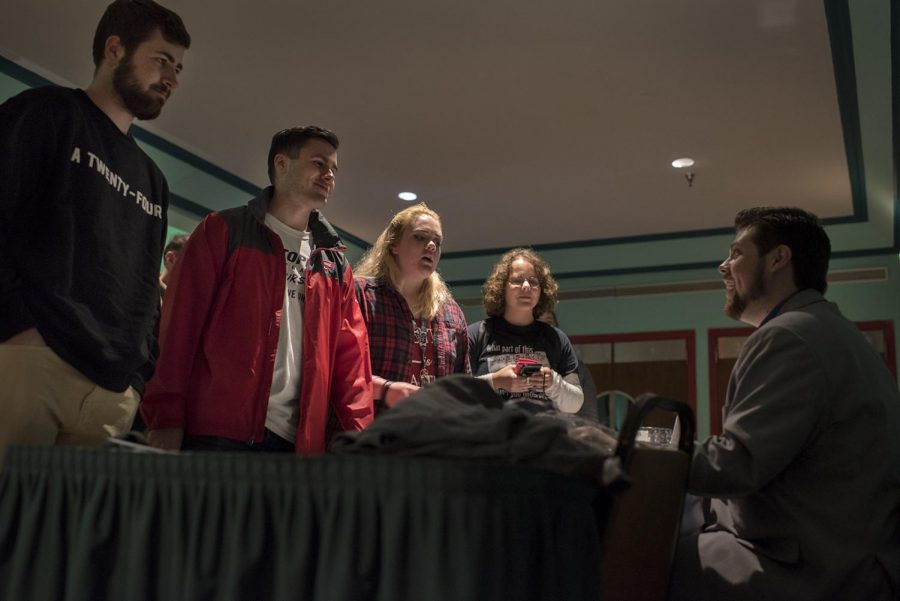Filmmaker Matt Schrader visits Bowling Green
October 25, 2017
As a part of the Southern Circuit Tour of Independent Filmmakers, Matt Schrader’s documentary “Score” was featured at Bowling Green’s Capitol Arts Center on Tuesday night.
South Arts, a regional nonprofit organization dedicated to bringing artistry to different communities throughout the South, offers a touring set of independent films with its filmmakers, known as the Southern Circuit.
Through the Southern Circuit, South Arts’ mission is to engage southern communities with film as an art form.
According to its website, “The Circuit takes the audience away from their televisions, computers, tablets and phones to connect them with independent filmmakers – live! Southern Circuit transforms watching film from a solitary experience into a communal one.”
The Circuit continued Tuesday night at the Capitol Arts Center as the Bowling Green community was welcomed to a screening of the film “Score” and to hear from director Matt Schrader.
“Score” is a documentary film focused on the creativity and challenges of being a Hollywood composer. It offers audiences a unique look inside the composing process. Film was something Schrader always found interesting.
Schrader went to college at the University of Southern California to study journalism. “I was pretty sure that was going to be my path,” Schrader said. “I guess [film] was just a casual interest I had for a while.”
The University of Southern California is known for its film program. Schrader became interested and later was accepted into their program.
“They tell you to have one degree that’s going to be your job and to have one that’s like a fun thing, a hobby or something you enjoy,” Schrader said.
He recalled finding himself very interested in the bonus features offered on DVDs. Through this, he found an interest in film scores.
After entering what Schrader called the “Netflix era,” he discovered an appreciation for documentaries.
“I started really enjoying documentaries. That was my favorite thing to watch. Netflix has such a great archive of those that you could watch a great documentary every night,” Schrader said.
While watching all of these documentaries, Schrader thought of a documentary he would enjoy seeing.
“I started to think, it would be really cool if someone made a documentary about film scores, about film composers and what they do, because I don’t really know what they do. I can’t wait to watch that documentary,” he said.
Several years passed and Schrader continued to pursue his career in television news. He conducted interviews and edited stories for projects.
“I kind of realized I at least had the technical skills to put together maybe some kind of documentary,” Schrader said.
Schrader then decided to contact film composers to see if he could make any progress on this documentary, a process he admits to not having a thought-out plan. He recalled his mindset being, “Let’s see if they’ll bite.”
“We were persistent and polite,” Schrader said. “And to our surprise, a lot of composers thought it was a cool idea.”
Each interview with a composer opened the door to an interview with another. Forming these connections allowed Schrader to conduct 67 interviews.
“People thought it was a cool topic so we kept on with it,” he said. “All in all, it took about two and a half years to shoot and edit and finish the film. We had to figure out at every step of the process what comes next. I’m a journalist, I’m not a filmmaker … It’s kind of cool that we knew nothing about this starting out and were able to figure it out and end up someplace. To some extent, we’re proud of what we’ve accomplished.”
Schrader saw the Southern Circuit as an interesting opportunity to connect people to independent films.
“It sounded like a really cool thing for us to be able to show to people especially because our movie is about a lot of other movies that people do know,” Schrader said. “We thought that if people watch our movie there’s a good chance that they’ll like it.”
Schrader elaborated on the importance of music in film and how different it can be, calling it “the heart of the movie.”
Schrader shared what he’d learned most from the process.
“If you’re dedicated enough, and take it step by step, and every day for a couple years make things just a little bit better, at the tail end of that you can end up with something that’s kind of cool.”
Reporter Laurel Deppen can be reached at 270-745-2655 and [email protected].






















![Megan Inman of Tennessee cries after embracing Drag performer and transgender advocate Jasmine St. James at the 9th Annual WKU Housing and Residence Life Drag Show at Knicely Conference Center on April 4, 2024. “[The community] was so warm and welcoming when I came out, if it wasn’t for the queens I wouldn’t be here,” Inman said.](https://wkuherald.com/wp-content/uploads/2024/04/smith_von_drag_3-600x419.jpg)


